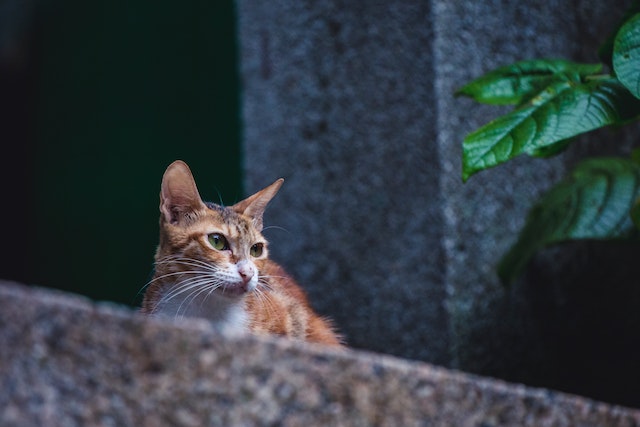10 Potential Factors Affecting Outdoor Cat Lifespan

Today, let’s dive into a topic that’s close to every cat owner’s heart: the Outdoor Cat Lifespan.
Have you ever wondered how long our feline friends can thrive in the great outdoors?
Well, buckle up as we uncover the secrets behind their adventurous lives and discover what makes them purrfectly suited for the wild!
Let’s get started, shall we?
Outdoor Cat Lifespan
Outdoor cats typically have a shorter lifespan than indoor cats, averaging around 2 to 5 years.
However, some outdoor cats with access to shelter, regular meals, and veterinary care can live into their late teens or early twenties.
Factors such as traffic, predators, and exposure to diseases can significantly impact the lifespan of outdoor cats.
Providing a safe outdoor environment and regular veterinary check-ups can help outdoor cats live longer, healthier lives.
Factors Affecting Outdoor Cat Lifespan
The following are some of the most common factors affecting outdoor cat lifespan:
1. Breed Genetics
Breed genetics can play a significant role in determining the overall health and potential lifespan of a cat.
Different breeds have varying predispositions to genetic conditions and diseases.
For example, certain breeds may be more prone to heart conditions, kidney diseases, or joint issues. These genetic factors can have a direct impact on the health and longevity of outdoor cats.
Additionally, some breeds may have specific dietary or environmental requirements that, if not met, can affect their overall health and lifespan when living outdoors.
2. Health Conditions
Outdoor cats face a wide array of health risks due to their exposure to the outdoor environment.
They are more likely to encounter fights with other animals, leading to injuries and potential infections. Parasites such as fleas, ticks, and worms are also common threats.
Furthermore, outdoor cats are at higher risk of contracting infectious diseases, such as feline leukemia and feline immunodeficiency virus, through interactions with other cats.
Regular veterinary care, including vaccinations, parasite control, and prompt treatment of injuries and illnesses, is crucial for maintaining the health and extending the lifespan of outdoor cats.
3. Availability of Clean Water
Access to clean water is vital for the well-being of outdoor cats. Dehydration can lead to a range of health issues, including urinary tract problems and kidney issues.
In hot or arid climates, the risk of dehydration is heightened, making a constant supply of clean water essential.
Additionally, clean water is essential for maintaining proper hydration, which supports overall health and can help outdoor cats better withstand environmental stressors.
Providing a consistent source of clean water can contribute significantly to the overall health and longevity of outdoor cats.
4. Presence of Predators
The presence of predators is a significant concern for outdoor cats. Predators such as coyotes, dogs, and larger birds of prey pose a constant threat to outdoor cats.
Encounters with these predators can lead to injuries or even fatal attacks, significantly impacting the lifespan of outdoor cats.
Additionally, the stress and anxiety of constantly being on alert for potential predators can also have negative effects on the overall health and well-being of outdoor cats.
5. Lack of Food
Outdoor cats may struggle to find consistent and adequate food sources. This can lead to malnutrition, weight loss, and an increased susceptibility to illnesses and parasites.
The lack of proper nutrition can weaken the immune system, making outdoor cats more vulnerable to diseases and reducing their ability to recover from injuries.
In severe cases, malnutrition can directly impact the lifespan of outdoor cats, making it crucial to ensure they have access to regular, nutritious meals.
6. Extreme Weather Conditions
Outdoor cats are exposed to the elements, including extreme heat, cold, and inclement weather.
Harsh weather conditions can lead to heatstroke, hypothermia, frostbite, and other weather-related illnesses and injuries.
Prolonged exposure to extreme weather can also weaken the immune system and make outdoor cats more susceptible to respiratory infections and other health issues.
Finding shelter from extreme weather is essential for outdoor cats to maintain their health and increase their chances of a longer lifespan.
7. Territorial Issues
Territorial disputes among outdoor cats can result in physical altercations, causing injuries and increasing the risk of contracting infections.
Fighting among cats can lead to wounds, abscesses, and other injuries that require medical attention.
Additionally, the stress and anxiety associated with territorial conflicts can have long-term effects on the overall well-being of outdoor cats, impacting their quality of life and potentially reducing their lifespan.
8. Exposure to Various Parasites
When outdoor cats come into contact with parasites like fleas, ticks, and worms, it can lead to a range of health issues.
Fleas can cause skin irritation, anemia, and transmit diseases. Ticks can transmit serious illnesses such as Lyme disease and anaplasmosis.
Additionally, intestinal worms can cause weight loss, diarrhea, and nutrient deficiencies.
These health issues, if left untreated, can significantly impact a cat’s overall well-being and potentially shorten their lifespan.
9. Traffic and Road Accidents
Outdoor cats face the risk of being involved in traffic accidents, which can lead to severe injuries or even fatalities.
Cats, being naturally curious creatures, might not be aware of the dangers posed by vehicles on roads.
As a result, the risk of being hit by a car is a significant concern for outdoor cats, and it’s important to consider this when evaluating their safety and well-being.
10. Access to Quality Nutrition
Outdoor cats may not have a consistent and reliable source of high-quality food, which can impact their nutritional intake.
Inadequate nutrition can lead to malnutrition, weakened immune systems, and a higher susceptibility to diseases and infections.
A lack of essential nutrients can affect a cat’s overall health and vitality, potentially shortening their lifespan.
Learn more about why outdoor cats live shorter lives.
Tips for Increasing Outdoor Cat Lifespan
Here are some common tips for increasing outdoor cat lifespan:
1. Regular Vet Check-ups: Regular veterinary check-ups are essential for monitoring your cat’s overall health. The vet can conduct thorough examinations, administer vaccinations, and address any potential health concerns. Early detection of health issues can significantly impact your cat’s lifespan and quality of life.
2. Proper Nutrition: Outdoor cats have different dietary needs compared to indoor cats. A high-quality diet that includes a balance of proteins, fats, and essential nutrients is crucial. Consider consulting with your vet to determine the best diet for your outdoor cat, taking into account factors such as their activity level and age.
3. Shelter: Outdoor cats require a safe and comfortable shelter to protect them from the elements. A well-insulated, waterproof shelter with cozy bedding provides a retreat from extreme temperatures, rain, and wind. It’s important to regularly clean and maintain the shelter to ensure it remains a comfortable and inviting space for your cat.
4. Fresh Water: Proper hydration is vital for your outdoor cat’s health, especially during hot weather. Ensure that your cat has access to clean, fresh water at all times. Consider using a heavy, stable water bowl or automatic water dispenser to prevent spills and contamination.
5. ID and Microchipping: In the event that your cat becomes lost, proper identification can greatly increase the chances of a safe return. Microchipping, along with a collar and ID tags, provides a reliable means of identifying your cat and reuniting them with you should they wander off.
6. Parasite Control: Outdoor cats are more susceptible to parasites such as fleas, ticks, and worms. Regular preventative treatments, as recommended by your vet, can help protect your cat from these pests and the potential health risks they pose.
7. Safe Environment: Creating a safe outdoor environment involves removing potential hazards such as toxic plants, chemicals, and other dangers. Providing a secure, fenced area or enclosed catio can offer your cat the freedom to roam while ensuring their safety.
8. Exercise and Play: Outdoor cats benefit from regular exercise and mental stimulation. Encourage playtime with interactive toys, climbing structures, and opportunities for hunting-like activities. These activities not only keep your cat physically fit but also provide mental enrichment.
9. Love and Attention: Spending quality time with your outdoor cat is crucial for their emotional well-being. Engage in interactive play, grooming, and affectionate interactions to strengthen your bond and provide a sense of security for your cat.
Learn more about the benefits of outdoor cats.
Frequently Asked Questions
How long do outdoor cats typically live?
The lifespan of outdoor cats can vary, but on average, they live between 2 and 5 years. However, it’s important to note that some outdoor cats can live well into their teens or even early twenties with proper care and attention.
Do outdoor cats have a shorter lifespan than indoor cats?
Generally, outdoor cats have a shorter lifespan compared to their indoor counterparts. This is because outdoor cats are exposed to various risks, such as accidents, diseases, predators, and harsh weather conditions. Indoor cats tend to have a safer and more controlled environment, which can contribute to a longer lifespan.
How can I help increase the lifespan of my outdoor cat?
There are several ways to help increase the lifespan of your outdoor cat. First and foremost, ensure they have regular vet check-ups and vaccinations to prevent diseases. Provide a balanced diet and fresh water, and consider spaying or neutering your cat to prevent certain health issues. Additionally, create a safe and secure outdoor space for your cat, such as a cat enclosure or a supervised play area, to minimize risks.
Are there any specific dangers outdoor cats face that can shorten their lifespan?
Yes, outdoor cats face various dangers that can shorten their lifespan. These include encounters with vehicles, fights with other animals, exposure to infectious diseases, ingestion of toxic substances, and attacks from predators. Additionally, extreme weather conditions can also pose a risk to an outdoor cat’s health.
Learn more about the dangers of outdoor cats.
Can I transition my outdoor cat to an indoor lifestyle?
Yes, it is possible to transition an outdoor cat to an indoor lifestyle. However, it may require patience and gradual adjustments. Provide plenty of mental and physical stimulation indoors, such as interactive toys and scratching posts. Keep windows accessible for them to observe the outside world. Consider creating a safe outdoor enclosure or providing supervised outdoor time to fulfill their need for fresh air and exploration.
Are there any benefits to keeping an outdoor cat?
While there are risks associated with outdoor cats, there can also be benefits. Outdoor cats have the freedom to explore and engage in natural behaviors, which can contribute to their overall well-being. They can help control rodent populations, provide companionship to other outdoor cats, and enjoy a more enriched environment. However, it’s important to weigh the risks and benefits carefully and ensure the safety and well-being of your outdoor cat.
Learn more about keeping your cat warm in winter.
Conclusion
In conclusion, the outdoor cat lifespan is a topic that sparks curiosity and concern among pet owners. By understanding the risks and taking necessary precautions, we can help our feline friends live longer and healthier lives. So let’s embrace responsible pet ownership, provide a safe environment, and enjoy the companionship of our outdoor cats for many years to come.

![How Do Cats Get Leukemia [9 Top Ways] How Do Cats Get Leukemia](https://petcreeks.com/wp-content/uploads/2023/04/How-Do-Cats-Get-Leukemia-768x555.jpg)




